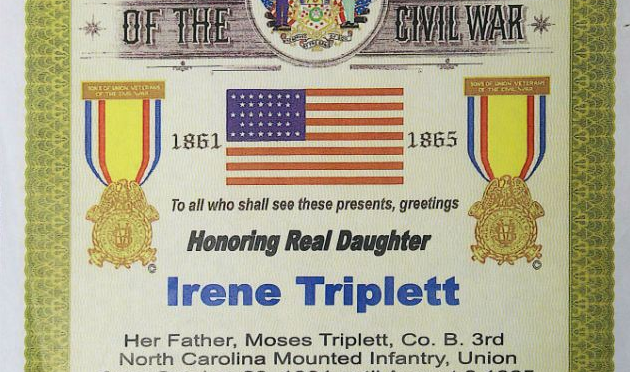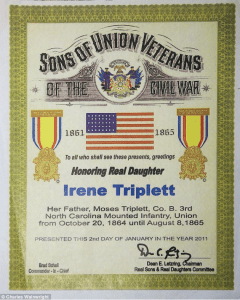It’s popular in contemporary American politics to question the effectiveness of government. Republicans often cast doubt that Federal agencies will be able to honor their commitments. For example, that reasoning is a popular theme for many state Governors refusing to comply with the ACA Healthcare expansion.
But a shocker of an article in the Wall Street Journal serves as a reminder that the US works hard to keep it’s word. Amazing as it sounds, the VA is still paying out Civil War benefits to a living American…
WILKESBORO, N.C.—Each month, Irene Triplett collects $73.13 from the Department of Veterans Affairs, a pension payment for her father’s military service—in the Civil War.
More than 3 million men fought and 530,000 men died in the conflict between North and South. Pvt. Mose Triplett joined the rebels, deserted on the road to Gettysburg, defected to the Union and married so late in life to a woman so young that their daughter Irene is today 84 years old—and the last child of any Civil War veteran still on the VA benefits rolls.
Ms. Triplett’s pension, small as it is, stands as a reminder that war’s bills don’t stop coming when the guns fall silent. The VA is still paying benefits to 16 widows and children of veterans from the 1898 Spanish-American War.
The last U.S. World War I veteran died in 2011. But 4,038 widows, sons and daughters get monthly VA pension or other payments. The government’s annual tab for surviving family from those long-ago wars comes to $16.5 million.
Spouses, parents and children of deceased veterans from World War II, Korea, Vietnam, Kuwait, Iraq and Afghanistan received $6.7 billion in the 2013 fiscal year that ended Sept. 30. Payments are based on financial need, any disabilities, and whether the veteran’s death was tied to military service.
Two things come to mind from this… War is much more expensive than people realize, and the US honors its commitments. It’s quite mind-boggling to think that we still have living connections to the Civil War, but Ms. Triplett serves as proof. Her situation also begs to wonder how long we’ll be paying for the war in Iraq or current conflict in Afghanistan.

